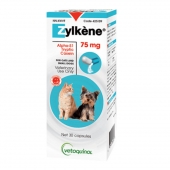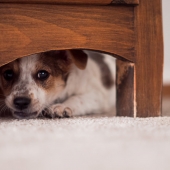Moving to a new home is far from relaxing. While we’re busy packing boxes and coordinating the move, it’s easy to forget what a stressful time this can be for our pets. Here are the signs of anxiety to watch out for in your four-legged friends.
Signs of a stressed cat
When cats are anxious, they are generally wary and alert. For example, they can feel the need to find a safe place to hide and curl up, ears flat and whiskers back. Some cats will meow, growl or vocalize as signs of their distress or unhappiness. Others will be hypervigilant, eyes open wide and pupils completely dilated.
Signs of a stressed dog
Depending on their temperament, dogs can express their worry in completely different ways. Some will cower or tremble, ears back or to the side, and move slowly and cautiously. Conversely, others will be on high alert, panting and pacing. A dog can lick its lips, but then refuse a treat. Some will yawn more often or widen their eyes, showing the whites.
Properly preparing a move
To alleviate anxiety, start packing your boxes as early as possible. This will help your dog or cat progressively get used to changes in their environment. If possible, set aside a room for them that you will pack last and fill it with their toys and bed.
In the weeks before the move, acclimate your pet to its crate by leaving treats or food inside. Help your pet get used to travelling in a carrier by doing quick car trips. Praise and reward them after each outing.
When moving day arrives, leave your pet with friends or family or at a kennel. This way, it can avoid the stress of comings and goings throughout the day, and you will have one less thing to worry about. When your pet arrives at your new address, it will be comforted to find familiar furniture in the new setting.
If you would rather keep your furry friend with you, leave it in a room with the door closed for the day, with everything it needs, and check on it often. If your pet does its business outside, respect the regular schedule as much as possible.
A visit to the vet
If the move brings you to a new city, make sure you get a copy of your pet’s health record and that tags and vaccines are up to date. If your cat or dog displays signs of anxiety, talk to your veterinarian: they can offer additional tips for the big day or recommend solutions to reduce stress. You can also ask them to refer you to a colleague close to your new home for your future needs.





